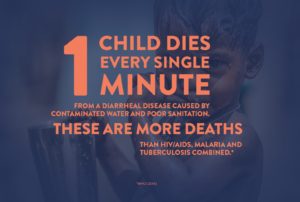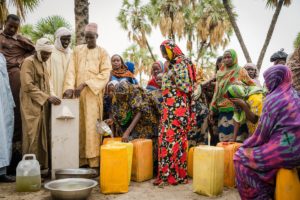By 2050, experts predict the global need for fresh water will increase more than 40%, as 1/4 of the world’s 9.7 billion people reside in regions experiencing “chronic or recurrent” lack of clean water. Malnutrition, malaria, diarrhea and heat stress could cause 250,000 additional deaths annually. 75% of the world population face the possibility of severe water shortages.
Currently, according to ClimateCare: Safe Water reports:
[list type=”caret”]
- more than 780 million people are at risk of water-borne illnesses such as typhoid and cholera due to insufficient access to safe drinking water
- poor water and sanitation contribute to 80% of illnesses in developing region, where one fifth of deaths in children under five are due to water-related disease.
- In sub-Saharan Africa, 40 billion hours per year are spent collecting clean water
[/list]
 In conjunction with World Water Week, the Environmental Health Coalition is hosting an August 30 Twitter Chat “What’s In Your Water? The State of Water and Our Health.”
In conjunction with World Water Week, the Environmental Health Coalition is hosting an August 30 Twitter Chat “What’s In Your Water? The State of Water and Our Health.”
Ensuring universal access to clean water and sanitation is the 6th of the United Nation’s 17 Sustainable Development Goals. A UN report last month found that billions around the world lack safe water, proper sanitation facilities.
The “What’s in Your Water” discussion is scheduled between 1-2 pm EST.
Follow @PublicHealth and the hashtag #SafeWater.
[divider]
[title type=”h3″]Project Highlight: Youth & Water [/title]
 One hundred Lake Chad youth, including some returning captives of Boko Haram, are learning skills to build 1500 bio-sand filters which can eliminate 90% of microbes in dirty water, thereby halving the number of deadly diarrhea cases. The group is also working on Water, Sanitation and Hygiene (WASH) indicators in the region by making soap, building latrines, and fixing water points.
One hundred Lake Chad youth, including some returning captives of Boko Haram, are learning skills to build 1500 bio-sand filters which can eliminate 90% of microbes in dirty water, thereby halving the number of deadly diarrhea cases. The group is also working on Water, Sanitation and Hygiene (WASH) indicators in the region by making soap, building latrines, and fixing water points.
One of the youth says he trained in repairing water pumps during his time at a UNICEF transition center following his escape from Boko Haram.
“When the water point in my village was broken, I helped the technician to fix it and made some money. Now I am learning how to make water filters and I am very proud to install these filters in the communities,” he says. “I have been sick because of dirty water so many times. If people drink clean water it will help a lot. I would like to work in the water sector, fixing water pumps, and build filters myself, even better ones.”
The water crisis in the Lake Chad region, where 1 in 3 people lack access to clean drinking water, has resulted in the displacement of 1.3 million people. (Source: EX-BOKO HARAM ABDUCTEES BRINGING CLEAN WATER TO THEIR COMMUNITIES, YALNA, “Nos enfants” UNICEF)

